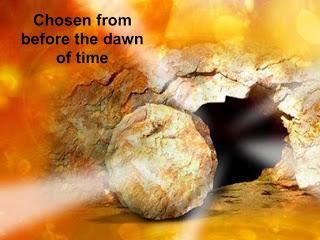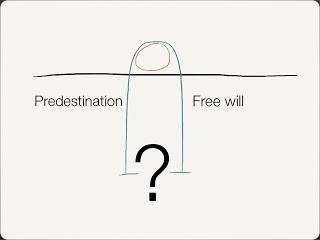
There are three slightly different versions
1. God predestines some to eternal life and some to death (this is known as double predestinarianism)2. God predestines the elect to life
3. God foreknows what we will choose and therefore predestines us accordingly (although this is not strictly predestination: our choice causally - if not temporally - comes first; and the divine choice is a consequence of our choice)
The teaching of predestination should lead to deep assurance and confidence, and not to anxiety or fear.
It should lead us to
1. CONFIDENCE IN GOD
a) God's purposes for the world are unshakeable, even in the face of horrific evil and hostile world. Acts 4:27-28 talks about how the most evil of all acts, the opposition to and crucifixion of the Son of God, was predestined by God. Even though it seemed that evil and death had triumphed, God was still totally in control.b) God's purposes for us are unshakeable, even in the face of our sin and suffering (Romans 8:28-30; Ephesians 1:5,11). We are predestined to be conformed into the image of Jesus.
c) God's mercy is for all who depend on God's mercy. The emphasis of Romans 9:13-18, 22-24 is not on the judgment of the damned but on the mercy of God. If anyone throws themselves on the mercy of God they will be saved.
2. HUMILITY NOT PRIDE
Throughout the Old Testament, God consistently chooses the younger child over the older, the weaker over the stronger, the outsider over the insider.1 Corinthians 1:27-30
In the end, the entire glory for our election and salvation goes to God. We cannot claim any credit.
3. FRUITFULNESS NOT COMPLACENCY
God does not choose X instead of Y. He chooses X for the sake of Y. God chooses Abraham so that 'through him, all people will be blessed'.John 15:15 'You did not choose me, but I chose you and appointed you .. To bear fruit'
Ephesians 1:4 'that we should be holy and blameless in him'
2 Timothy 2:10 'Therefore I endure everything for the sake of the elect, that they too may obtain the salvation that is in Christ Jesus, with eternal glory'.
Before St Augustine, predestination never seems to have been an issue. The emphasis was on both divine initiative and human response to that initiative. The early church writers taught that this was about synergy (working together with God). So, for instance, when we are told that 'God hardens Pharoah's heart' this was considered to be both causal of and consequential on Pharoah hardening his own heart. They didn't really worry which came first.
In about 370AD the monk Pelagius was believed to be saying that 'We go to heaven because we deserve to go to heaven'.
St Augustine replies and argues that not only was Christ God's gift to us, but the fact that we put our trust in Christ is also God's gift to us. The fact that any of us go to heaven is not because we deserve it, but because of the sheer grace and mercy of God.At first he says that God foreknows our decision and so predestines us to believe; but in his later years he teaches that some are predestined to life and others to death (what we call above 'doube-predestinarianism').
The church sided with Augustine in his argument against Pelagius. However it could never accept his fully developed position on predestination. They argued that God predestined people to life, but they were silent on the reason why people did not believe. It was only during the Reformation, with the teachings of Calvin, that a minority of believers adopted a strict double predestinarianism. The majority continued to maintain the earlier position of the church.
So, for instance, the Anglican position stated:
"Predestination to Life is the everlasting purpose of God, whereby ... he hath constantly decreed by his counsel secret to us, to deliver from curse and damnation those whom he hath chosen ... to bring them by Christ to everlasting salvation ..." (39 Articles)It presumes to say nothing of those who do not come to Christ
There is a more refined position which states that Christ is the one who is predestined. In him all have life, but people choose to opt out by refusing to put their trust in him.
Whilst this is very Christ-centred, I am not sure that it answers the question. Why do some refuse to put their trust in Christ and others do? Are those who do trust him either more humble or better than other people? In which case it could be argued that we are back to the 'pelagian' position that those who are saved deserve to be saved. The credit therefore belongs to the saved, rather than the God who saves.
THE PROBLEM OF DOUBLE PREDESTINARIANISM
The problem of the position which says that God predestines some to life and some to death, is that:a) it turns God into someone who creates people in order to damn them to eternal torment. If God knows that there is no possibility of repentance for some people, because they are predestined to death, why create them? It appears to turn God into satan. Paul wrestles with this in Romans 9 and comes very close to universalism (without going there) in the subsequent chapters. He ends the section of chapters 9-11 instead by shifting into doxology, praise of God whose wisdom is beyond our understanding.
b) it ignores those many references which speak of human free will and choice: for instance, Deut 30:19; Joshua 24:15; Jeremiah 18:7-10; John 3:16; Matthew 11:28-30
c) the bible does not speak explicitly of predestination to death. Even the texts which imply that Judas was predestined to betray Jesus, also talk of him having a choice; and Paul in Romans 9 does not build a theology upon a double predestinarianism. He significantly distances human thought from divine thought: 'What if God ... ' when talking about preparing 'vessels for destruction'.
d) double predestinarianism is often associated with the teaching that Christ's death was not for all but only the elect (so-called limited atonement). I would argue this is both unbiblical and leads to a critical loss of assurance. You can never know that you are one of the elect until the point of death. You may have the right belief, the right feeling; you may put your trust now in the mercy of God, but you can never know that you are not one of the elect, and that you may fall away at the end. You have to trust the fact that God has chosen you, and not just the work of Christ on the cross (which may not have been for you, anyway). You cannot say with Paul that you 'know who you have believed and [are] convinced that he is able to guard what [you] have entrusted to him until that day' (2 Timothy 1:12).
[In the same way, those who emphasize free will over against predestination also lose assurance. Salvation is completely up to us. It leads us to a religion of works. Our inaction may mean that some will be damned. It means we put too much pressure on ourselves and on others].
My own conviction is that the bible does teach a predestination to life, but not a predestination to death. It places responsibility with those who refuse to come to Christ with those who make that decision.
While I recognize that this is not logical according to human reason, I become wary when we go further than what the bible teaches. The danger of systematic theology is that we choose to give preferential weight to certain texts over against other texts. Obviously we need to do that, but when we do need to make choices we should be guided by how the majority Christians of former years (the Church) have interpreted those texts. We should be very cautious of constructing theological systems which end up saying things that cannot be justified by the bible.
THE NEED FOR BOTH PREDESTINATION AND FREE WILL
We need to hold together both predestination and human free will, divine sovereignty and human freedom. The Bible teaches both. For instance, Paul writes, 'Think on what I am saying and the Lord will give you understanding in all of this' (2 Timothy 2:7).
Of course, our human minds cannot hold them together.
We can only look at one side of the coin or the other. We cannot look at both sides at the same time.
We need to pray as if it is all up to God (but recognize we have a part to play, including our prayer), and preach as if it is all up to us (yet recognize that only God can change hearts and minds).
It is as if the entrance to heaven has, written above it, 'enter here all who would have life',

but on the other side, as we look back, has written, 'chosen before the dawn of time'.

It is the image of the room in which two ropes hang down. One says predestination and the other says free will. But unknown to us they are one rope around a pulley above the ceiling. If we hold on to one, it will not hold us. It is only when we hold on to both together that we will be held.

John 6:35-37, Then Jesus declared, “I am the bread of life. He who comes to me will never go hungry, and he who believes in me will never be thirsty. But as I told you, you have seen me and still you do not believe. All that the Father gives me will come to me, and whoever comes to me I will never drive away.
This verse holds together everything: the invitation of Christ; human culpability for refusing to believe; the fact that those who come to Jesus are the gift of the Father to him; and the assurance that if we come to Jesus he will never turn us away.
I finish with a personal story. There was a time when, as a young minister, I emotionally and physically crashed. The circumstances are not important here. In my despair I never doubted the existence of God, but I did doubt that I belonged to him. It was at about 3am, lying awake in great confusion, I remembered (or did God bring it to my mind?!) John 6:37. I remember praying, 'Jesus, I don't know really what this means, but I do come to you, and I know you will never turn me away'
If, in thinking about this subject, you wonder if you are one of the elect, or you are led to angst, I invite you simply to say to Jesus, 'I come to you'. I invite you to throw yourself on him. He will never turn you away, and 'you will find rest for your soul'.

